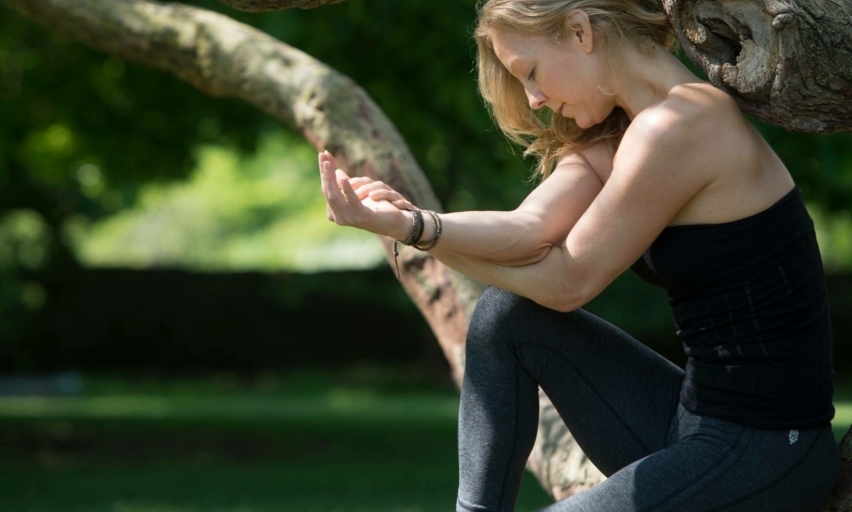
Yoga Therapy and Addiction
December 9-11, 2022
9:30am- 5:30pm
Founder of PranaYoga, Creator of Somatic Vinyasa Yoga Therapy, Author, Yoga Therapist, and Ayurveda Wellness Counselor
Dani “Pranavani” is the founder of PranaYoga and the visionary behind the Somatic Vinyasa Yoga Therapy method. With over 22 years of yoga practice and a dedicated focus on yoga therapy since 2007, her journey into the healing arts began as a personal quest to overcome an eating disorder and chronic pain. Through the transformative power of Yoga and Ayurveda, Dani found healing and purpose, which she now shares with others through her therapeutic offerings and teachings.
Dani is the author of The Path of Joyful Living, a contemporary exploration of kriya yoga and the psychology of yoga. She has a profound commitment to helping individuals navigate life with greater ease, particularly those facing cancer, chronic pain, or other health challenges. As a certified Yoga Therapist accredited by the International Association of Yoga Therapists (IAYT), she leads the PranaYoga Institute, which offers a 1,000-hour IAYT-accredited Yoga Therapy Diploma program.
In addition to training future yoga therapists, Dani works one-on-one with clients, providing personalized Ayurveda and Yoga Therapy sessions designed to foster balance and well-being.

Share
"Food, drug, chemical and behavioral addictions (porn, gambling, electronics, social media, etc.) contribute to wreak havoc and destroy lives and communities. Mental Health providers frequently refer their clients to Yoga programs as an adjunct to treatment. Addictions are some of the most common of all illnesses and are exploding in our culture. Yoga Teachers play a unique interdisciplinary role with other treatment providers." - Dr Dave Johnson
In this module, students learn how to use yoga and Ayurveda in relationship to addictions, that will provide you with skills to work with clients privately, in clinics, and group settings.
The training will discuss—physiology, psychology, and behavior—so as to greatly enhance the likelihood of preventing relapse and overcoming addictions. As well as treatment programs and recovery through the ancient art and science of Ayurveda and yoga.
Upon successful completion of this module, students will be able to:
Understand:
· How to teach a 12-week course of yoga, Ayurveda and relaxation practices useful for addiction and recovery settings.
· How to work with addictions and recovery from the perspective of yoga, Ayurveda, and mindfulness with individual clients and groups.
· Why we become addicted to substances and behavioral patterns.
· Which underlying neurological and psychological tendencies make people more vulnerable to addiction.
· How different substances impact the physiological systems of the body.
· What happens in the brain when we practice yoga and mindfulness and how this knowledge can be applied to people struggling with substance abuse.
· Specific yoga practices for addiction and recovery
· The 12-step recovery program, history, how it works and connecting to a 12-step community.
· Foundational mental health and addiction concepts to bridge the gap of advocacy, collaboration and referral.
· And identify foundational mental health concepts related to Addiction.
· Common signs and symptoms of addictive behaviors
· The importance of other behavioral techniques such as cognitive behavior therapy, journaling, mindfulness, and community referrals such as 12-step programs and therapy.
· Common psychopharmacological therapies used with addictions.
· How to promote feelings of safety in class and beyond
· What kinds of long-term goals and practices can be created for helping the addict to remain substance free.
· How to reframe your understanding of addiction and how to overcome personal and societal stigmas about addiction
· The biology, physiology, and psychology of addiction
· How to use the science of Ayurveda to treat addiction individually with yoga and healthy self-care habits
Explain:
· How the yogic perspective can replace the addict worldview.
· What awareness is and how we can teach people to be with the ‘higher mind’
· How yoga and mindfulness can be integrated into other frameworks for working with addictions
· How to create a supportive tribe
· The importance of cultivating joy and humor.
Describe:
· How to effectively use yoga, including pranayama, asana and meditation to manage addictive behaviors and detoxify.
· How yoga practice and help curve cravings
· Dietary and nutritional support for recovery
Define:
· Manas prakrati of addiction and how yoga therapy supports the mind.
Recommended reading: In the Realm of Hungry of Hungry Ghosts by Gabor Mate.
Materials to bring: standard yoga props (2 blocks, 2 blankets (or 1 blanket and 1 bolster), and strap).
Founder of PranaYoga, Creator of Somatic Vinyasa Yoga Therapy, Author, Yoga Therapist, and Ayurveda Wellness Counselor
Dani “Pranavani” is the founder of PranaYoga and the visionary behind the Somatic Vinyasa Yoga Therapy method. With over 22 years of yoga practice and a dedicated focus on yoga therapy since 2007, her journey into the healing arts began as a personal quest to overcome an eating disorder and chronic pain. Through the transformative power of Yoga and Ayurveda, Dani found healing and purpose, which she now shares with others through her therapeutic offerings and teachings.
Dani is the author of The Path of Joyful Living, a contemporary exploration of kriya yoga and the psychology of yoga. She has a profound commitment to helping individuals navigate life with greater ease, particularly those facing cancer, chronic pain, or other health challenges. As a certified Yoga Therapist accredited by the International Association of Yoga Therapists (IAYT), she leads the PranaYoga Institute, which offers a 1,000-hour IAYT-accredited Yoga Therapy Diploma program.
In addition to training future yoga therapists, Dani works one-on-one with clients, providing personalized Ayurveda and Yoga Therapy sessions designed to foster balance and well-being.